I don’t find it right to preach the gospel without denouncing Communism.
—Richard Wurmbrand, a Christian pastor who spent 14 years in Communist prisons for practicing his faith—
Socialism is precisely the religion that must overwhelm Christianity. … In the new order, Socialism will triumph by first capturing the culture via infiltration of schools, universities, churches and the media by transforming the consciousness of society.
— Antonio Gramsci, a Marxist who has been called “The Godfather of Cultural Marxism” —
Overview: This is a Bible study that demonstrates that Marxism, cultural marxism, and the social justice movement are promoting ideas contrary to biblical principles. These movements oppose Christianity and the church. Christians must be aware of the issues surrounding this conflict, understand them, and be able to articulate why the teachings of the social justice movement are wrong. This study will help.
If you wish to cover this material in one session, you can do that; but be aware that if your group meets once, you’ll probably need at least an hour-and-a-half to two hours. The facilitator can feel free to adapt this material into a two- or three- session study if desired. Suggestions for where to break for the two- and three- session options are presented in the body of the material.

Open with prayer, asking God to guide your study and make you and your group like the men of Issachar in 1 Chronicles 12:32. They “had understanding of the times, to know what Israel ought to do”
Share the following graphic. A PDF file of this visual is available here.

Discuss:
-
-
-
- What is vertigo?
- Under what conditions does it typically occur?
- What danger or potentential does vertigo pose?
- What must be done to overcome it?
-
-
Share the following paragraph, or ask a participant to summarize it or read it aloud.

At 8:39 p.m. on July 16, 1999, John Kennedy, Jr., his wife, and his sister-in-law departed in a single-engine plane from Essex County, New Jersey, to attend his cousin’s wedding the next day. Sadly, the aircraft crashed and none survived. Vertigo, a condition in which the pilot’s internal system of balance is thrown askew, making it impossible to sense the position, speed, and trajectory of the plane, likely was a factor in the crash. To overcome vertigo, a pilot must exercise an iron will to rely fully on the plane’s instruments, which don’t mislead.
Explain that this tragic accident, and many others, offer us a practical lesson for life.
Many people today have a form of vertigo in their lives. They base all kinds of judgments on feelings. Absolute truth—moral and ethical standards of right and wrong—can be likened to a plane’s instruments. For the Christian, truth is found in the Bible—God’s Word—but nature (natural law) and conscience certainly are more reliable sources of truth than one’s feelings. Basing one’s decisions in life on absolute truth ensures a safe flight and a safe landing—but we must refuse to follow feelings and must swim upstream against today’s cultural tide.
Share that this Bible study is about social and cultural vertigo. It’s also about spiritual vertigo. A great many false ideas and teachings are taking hold in society and the church because people’s judgments and beliefs aren’t grounded in objective truth, but in their feelings.
A great many false ideas and teachings are taking hold in society and the church because people’s judgments and beliefs aren’t grounded in objective truth, but in their feelings.
Say: Understandably, non-Christians may readily be carried along by the prevailing narrative and the cultural tide, but Christians must never be. In his letter to the Colossians who were followers of Christ, Paul sounded a warning believers today need to hear and heed: “Beware lest anyone cheat you through philosophy and empty deceit, according to the tradition of men, according to the basic principles of the world, and not according to Christ” (Col. 2:8). A PDF file of the following slide is available here.
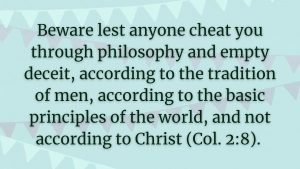
Ask your participants to recall also that at the end of His sermon on the mount, Jesus said,
Whoever hears these sayings of Mine, and does them, I will liken him to a wise man who built his house on the rock: and the rain descended, the floods came, and the winds blew and beat on that house; and it did not fall, for it was founded on the rock. But everyone who hears these sayings of Mine, and does not do them, will be like a foolish man who built his house on the sand: and the rain descended, the floods came, and the winds blew and beat on that house; and it fell. And great was its fall (Matt. 7:24-27).

Jesus’ sayings encompass the whole of Scripture, for He affirmed God’s Word as truth in John 17:17. A PDF file of the above slide is available here.
Shouldn’t Christians be loving? We must be loving, of course; but we also must know that love never abandons the truth. It upholds it!
A Misrepresentation of Justice
Say: A great deal is being said about justice today. People care a great deal about it, and they should. Christians especially should care about justice. Yet we must understand that to uphold it, we have to exercise sound judgement, judgment based on truth and reality. We must follow our heads, not merely our hearts.
Continue: In just a few minutes we’ll talk about why this is the case, but let’s think now about how people with nefarious motives can play on people’s emotions to import a great many false teachings into society and the church.
Explain: Under the “feel good” mantras of compassion, justice, and fairness; the social justice movement (SJM) promotes socialism and Marxism and maligns capitalism as oppressive and unfair. Social justice advocates pit whites against blacks, men against women, and heterosexuals against homosexuals and other LGBT individuals. A PDF file of the following slide is available here.

Elaborate: Some social justice crusaders are well intentioned, but many have nefarious motives and know full well what they are doing. They say that blacks, women, and homosexuals are oppressed by a society and culture stacked against them. Their rhetoric notwithstanding, things are not always as they seem or appear; nor are they always as the prevailing narrative depicts them. We will do well to learn just where the social justice movement with its Marxist underpinnings is taking the United States as nation and American citizens as individuals.
Christians Have a Duty to Uphold Biblical Justice — Not What People Think or Believe Justice Is

Summarize: Furthermore, as Christians, we must evaluate the social justice movement in light of biblical teachings. This movement and its teachings have invaded the church! Do Marxism and social justice tenets align with Scripture at all, or do these movements stand together in opposition to what the Bible tells us about economic and social systems and human activity within them?
Does the Bible even have anything at all to say about economic and social systems? Actually, yes, it does; and what it has to say may surprise you.
Share that in this Bible study you will contrast several tenets of the SJM to biblical teachings and show that they are two very different belief systems that promote opposite and mutually exclusive ideas.
Indicate that one of the first things people need to do is become familiar with some key terms and what they mean. In advance, reproduce this handout for each of your participants. It defines terms we will use in this study, or that are related to ideas presented in the study. They include
-
-
-
-
-
- socialism
- Marxism
- communism
- capitalism or free enterprise
- social justice
- woke
- cultural Marxism
- critical race theory (CRT): slide 1; slide 2
- intersectionality
-
-
-
-
- Briefly summarize what each item on the list means. Yes, this is a lot to take in, but your participants have the handout to take home and study after the Bible study session. Becoming generally familiar with each of these terms and what they mean will help you and your class members as you discuss Karl Marx’s beliefs during the latter half of the study.
If you are leading a three-session Bible-study series,
here is a good place to end the first session.
Fairness Does not Mean Equal Outcomes
Display this slide and ask your participants to respond to it. A PDF file is available here.
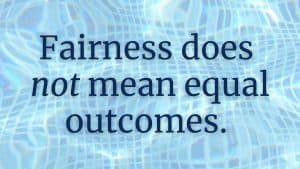
Say: Instead, it means being equally unhindered from taking advantage of natural opportunities to succeed, and being free to carve out additional opportunities to succeed that don’t infringe on the rights of others.
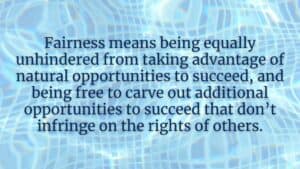
Discuss what this means in practical terms.
Ask: What is government’s role? Point out that preserving fairness means, among other things, protecting the unalienable rights of all.
Yet many people contend for “fairness” based on their feelings. Remind the members of your group: We indicated earlier that a type of vertigo has taken hold in society and the church. We said, “Under the ‘feel good’ mantras of compassion, justice, and fairness, the social justice movement promotes socialism and Marxism and maligns capitalism as oppressive and unfair. ” Is capitalism really unfair, or are we being manipulated through emotional rhetoric?
Background information: We addressed the question of capitalism’s fairness to a large extent in a series titled “The Bible and Free Enterprise.” Here is an article that summarizes the key ideas we presented in that series. You will not have time to cover this material in your session, but you can recommend it to the members of your group. Share with them the article is mentioned, and the web address given, on page 2 of the handout of key terms and their definitions. Encourage your class members to read the article within a few days of the Bible study session.
Note: In the following several paragraphs, hyperlinks to articles and videos are intended to provide background information for you, the facilitator. Do not try to present this information during the session. the heart of the study will be a discussion of how Marxist principles oppose biblical truths.

Explain to your participants: Despite the message conveyed in today’s prevailing narrative, capitalism provides the greatest amount of freedom, the greatest incentive for productivity and creativity, and the greatest number and kinds of benefits for both producers and consumers.
Admit: Yes, capitalism can be abused, but when the players operate within the ethical guidelines the free market expects, it works as does no other system to enhance prosperity and diminish poverty. By contrast (contrary to what you and your class members likely have heard), socialism and Marxism turn citizens into slaves of the state. Implementation of socialist and social justice principles squelches productivity and creativity and incites envy and greed (also go here).
Highlight cultural Marxism. As we noted in our definitions of key terms, whereas Marxism focuses on economics, cultural Marxism takes Marxist principles and applies them to cultural categories such as race, class, sex differences, and sexual behavior (or what LGBT advocates would call sexual orientation). All the envy, greed, resentment, and hostility that Marxism brings to economic categories are given fertile ground in these other categories by cultural Marxism and its teachings. All of this relates directly to the social justice movement, because the SJM has Marxist underpinnings. It sees racism everywhere it looks, and it even finds racism where none exists. It stirs up animosity, hatred, and division as does no other ideology.
Despite compassionate-sounding rhetoric, the social justice movement with its Marxist underpinnings sees racism everywhere it looks, and it even finds racism where none exists. It stirs up animosity, hatred, and division as does no other ideology.
Why has the social justice movement been so successful at throwing up all these relational barriers? Here are two major reasons. People don’t know what authentic justice looks like, nor do they know what freedom and liberty involve.2
Let’s first consider the matters of justice and fairness. Fairness does not mean equal outcomes, but equal opportunities — and equal opportunities means people are equally unhindered by government and by other individuals and entities from pursuing their dreams. Alexis de Tocqueville put it this way: “Democracy and socialism have nothing in common but one word, equality. But notice the difference: while democracy seeks equality in liberty, socialism seeks equality in restraint and servitude.” A PDF file of the following slide is available here.
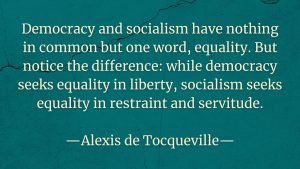
The term justice does not mean equal outcomes, either. As Dr. Calvin Beisner contends in his excellent booklet “Social Justice: How Good Intentions Undermine Justice and Gospel,” Exercising and promoting justice means “rendering (1) impartially and (2) proportionally (3) to everyone his or her due (4) in accord with the righteous standard of God’s moral law.” The second item, proportionality, means simply that the punishment or reward fits the wrong or commendable deed in question. As background information, here is a page that lists Scripture passages supportive of each of these four elements (a printable page offering the same information is available here).
You can order an updated and expanded edition of Dr. Beisner’s booklet here. A PDF file of the following slide is available here.
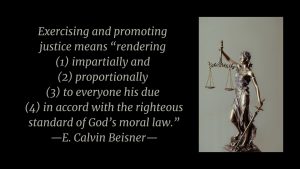
Ask: Do you see how exercising and promoting justice demands that we make judgments using our heads and not our hearts? Do you see how resisting vertigo in this area requires that we uphold God’s law, objectively evaluating the facts of each case and making judgments accordingly?
A second reason the social justice movement and Marxism have been so successful in stoking conflict between groups is because of a distorted understanding of true freedom and liberty. As Josh McDowell has observed, freedom isn’t being able to do whatever you want to do; it’s having the power to do what you ought to do. Thus, freedom and liberty — and happiness as well — are tied inseparably to duty and responsibility. These are opposite sides of the same coin. A PDF file of the following slide is available here.
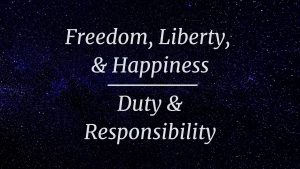
Let’s put it another way: Performance of duty is the doorway to authentic liberty and happiness.3 A PDF file of the following slide is available here.

If time allows, briefly discuss how it’s true that freedom and liberty are tied to fulfilling one’s duties. Part of the reason is that to maintain order in society, people must respect the rights of others; they cannot simply do whatever they may be inclined to do. Another reason is that exercising self-discipline to do the things we ought to do enables us to have the resources and means to do the things we want to do. Note that Zig Ziglar said, “If you will be hard on yourself, life will be easy on you. But if you insist upon being easy on yourself, life is going to be very hard on you.” A PDF file of the following slide is available here.

If you are leading a two-session Bible-study series,
here is a good place to end the first session.
Transition: Against this backdrop, let’s examine nine biblical principles and showcase them against numerous statements made by Karl Marx. What more direct way could there be to examine Marxism than to read what Marx himself wrote and believed? I have taken Marx’s statements from just one Internet quotations website, azquotes.com; I did not do extensive research to “dig them up.” In other words, these are predominant, well-known statements from Marx. As you read these, note how Marxist ideas have taken hold in various places and among numerous leaders in our own country. Also note how thoroughly they are gaining a foothold in society at large — and in the church.
Marxism Is Unbibilcal, and Even Anti-Biblical and Anti-Christian
Principle 1: The God of the Bible, and none other, is God; and we are to acknowledge and revere Him and Him only. (See Ex. 20:1-3; Deut. 5:5-7; 13:4; Neh. 9:6; Ps. 14:1.)

By contrast, Marx said,
-
-
- Communism begins where atheism begins.
- My object in life is to dethrone God and destroy capitalism.
- There are, besides, eternal truths, such as Freedom, etc., that are common to all states of society. But Communism abolishes eternal truths, it abolishes all religion, and all morality, instead of constituting them on a new basis; it therefore acts in contradiction to all past historical experience.
-
Ask: Why do you think God began His lists of the Ten Commandments with a statement of who He is? Emphasize in your discussion that God isn’t just real; He also is personal. You can interact with Him. He has revealed Himself in His Word, the Bible. Members of the human race, His highest creation, are accountable to Him and responsible for how they respond to His overtures.
Ask and discuss: Why does Psalm 14:1 call the atheist — the one who believes and says God does not exist — a fool? What reasons would you give that the atheist is a fool?
Ask your participants to notice that the second quote from Karl Marx listed above mentions both God and capitalism. Could it be that capitalism has God’s fingerprints all over it, and that Marx innately understood (even if he did so unconsciously) that opposing God had to mean opposing capitalism as well? State that the additional principles you will discuss will show some of the ways God’s handiwork is evident in the free enterprise system. Principle 2 is a great example.
Principle 2: God created every member of the human family in His image. Everyone is a sovereign1 individual, and every person should be treated with dignity and respect. (See Gen. 1:26-28; 9:6.)
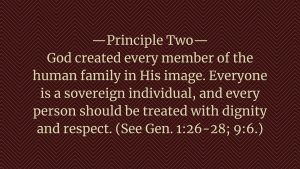
Marx denied this biblical tenet. He said,

Point out that the Bible says only of human beings that God made them in His image. What are some qualities that set human beings apart from all the other members of God’s creation?
Emphasize that Genesis 9:6 is very pro-life. It reflects respect for human life by demanding that human beings respect and honor the lives of others. Murderers are to pay with their own lives. Say: It is no coincidence that communist and socialist regimes have brought about the deaths of more than 100 million people. Communism and socialism have no regard for human life but see people as disposable once they have outlived their usefulness to the state.
Ask: In your opinion, how does the free enterprise system affirm human freedom and rights within limits that also respect the freedom and rights of others? Isn’t this an indication of God’s intention for humanity in human interactions? God wants people to live freely, yet within guidelines respecting the lives and rights of others (ideas, that, by the way, are upheld in the Declaration of Independence.)
Principle 3: The Bible commends hard work and the benefit of enjoying the results of one’s labor. (See Prov. 6:6-11; 10:4-5; 12:14; 13:4; 14:23; 16:26; 22:29; 28:19; Eccl. 3:9-13; 2 Thess. 3:6-12.)
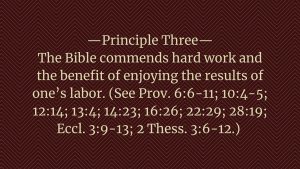
On the other hand, Karl Marx said:
-
-
-
- A heavy or progressive or graduated income tax is necessary for the proper development of Communism.
- From each according to his abilities, to each according to his needs. Marx was referring to government redistribution of wealth, a tenet of the social justice movement.
-
-
Adrian Rogers was right when he observed,
 You cannot legislate the poor into freedom by legislating the wealthy out of freedom. What one person receives without working for, another person must work for without receiving. The government cannot give to anybody anything that the government does not first take from somebody else. When half of the people get the idea that they do not have to work because the other half is going to take care of them, and when the other half gets the idea that it does no good to work become somebody else is going to get what they work for, that my dear friend, is about the end of any nation. You cannot multiply wealthy by dividing it.
You cannot legislate the poor into freedom by legislating the wealthy out of freedom. What one person receives without working for, another person must work for without receiving. The government cannot give to anybody anything that the government does not first take from somebody else. When half of the people get the idea that they do not have to work because the other half is going to take care of them, and when the other half gets the idea that it does no good to work become somebody else is going to get what they work for, that my dear friend, is about the end of any nation. You cannot multiply wealthy by dividing it.
The following verses from Proverbs are included in our list of passages for Principle 3: Proverbs 10:4-5; 12:14; 13:4; 14:23; 28:19. Read these passages to the group or ask one or more participants to read them. Ask: How could these principles be true without the free enterprise system, or at least some of the key elements of capitalism? (They couldn’t.) Emphasize that the Bible doesn’t argue for the free enterprise system; it rather assumes it. In so doing it gives it the strongest endorsement possible.
Ask: How does socialism’s plan for heavy taxation and redistribution of wealth punish those who work hard and reward those who are lazy? It almost goes without saying that Marx’s two quotes under Principle 3 seek to upend and defy biblical principles!
Ask: How do these passages (from Proverbs) affirm and encourage human responsibility? How do they uphold human freedom? How do they authorize consequences, both good and bad — rewards for responsible behavior and negative consequences for laziness? Ask a participant to explain why these scenarios naturally unfold under capitalism.
If you are leading a three-session Bible-study series,
here is a good place to end the second session.
Principle 4: In connection with human sovereignty (having been made in God’s image) the Bible affirms property rights. (See Ex. 20:15,17; Deut. 5:19,21.)
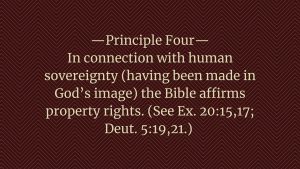
Karl Marx was vehemently opposed to the idea of private property.
The theory of Communism may be summed up in one sentence: Abolish all private property.
Alarmingly, aversion to property rights is taking hold in America — but of course that doesn’t mean people are willingly getting rid of their stuff. They just think they like the idea of a society where everyone has his or her needs met, even if it means they are bereft of material goods. The matter of how people can have their needs met if they can’t own anything apparently doesn’t strike them as strange. Don’t misunderstand. I’m all for people’s needs being met, but within reality’s limits. Here is the truth. Socialism works only in people’s imaginations. It doesn’t meet people’s needs; it multiplies them!
Background information: Watch this video produced by the World Economic Forum (WEF), and note this key message. What’s wrong with it? Well, quite a bit, actually! Learn more here! A PDF file of the following slide is available here.

Ask participants to explain how the Eighth Commandment and the Tenth Commandment uphold property rights.
Ask participants to explain in their own words why elimination of private property will definitely not make people happy and will even make them mad. Emphasize, however, that the idea that “In 2030, you’ll own nothing, and you’ll be happy” apparently has emotional appeal for many. Ask: Why is this?
Emphasize that while the Bible affirms property rights, it condemns materialism. Explain how being a good steward of what one owns can be a source of true happiness and satisfaction, and can be and is a part of living a righteous life before God.
Principle 5: The Bible affirms economic freedom, including the exchange of what one owns for something else.4 This implies benefit for both the buyer and the seller. (See Genesis 23; Matt. 13:44-46; 20:1-16; 24:45-51; 25:14-30; Mark 12:1-9; Luke 10:25-37.)
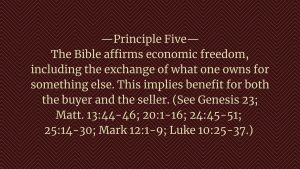
Karl Marx viewed economic freedom with disdain.
Yet capitalism does increase wealth and decrease misery simultaneously. Furthermore, we need to be aware that communism, socialism’s sister, doesn’t alleviate misery at all. Rather, it creates and exacerbates it.
Emphasize that in Genesis 23, Abraham buys a burial cave and the surrounding field to have a place to bury the body of his deceased wife, Sarah. Listen to what historian David Barton says about this passage in the following clip from the February 6, 2020 episode of Walbuilders Live! The first voice you’ll hear will be that of co-host Rick Green.
Encourage participants also to note that in the parable of the workers in the vineyard, when the workers who had worked all day and received a day’s wages objected when they saw that those who worked less were receiving the same amount, the landowner replied, “ Is it not lawful for me to do what I wish with my own things?” (Matt. 20:15). Not only is economic freedom affirmed, but everyone whom the landowner hired benefitted, even those who complained. A PDF file of the following slide is available here.

Principle 6: The Bible commends charity from individuals, the church, and, by extension, faith-based organizations. (See Lev. 19:9-10; 23:22; Deut. 24:20-22; Prov. 14:21; 17:5; 19:17; 22:9; 28:3; 29:7; Acts 11:27–30; Rom. 15:25–27; 1 Cor. 16:1–4; 2 Cor. 8:1–9:15; Gal. 2:9-10; Eph. 4:28.)
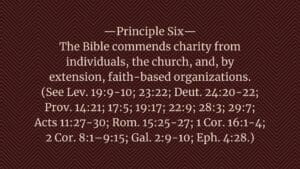
Karl Marx believed the state should take from those who have to give it to those in need. With socialism, government coercion is the order of the day.
From each according to his abilities, to each according to his needs.
Ask a participant to read Leviticus 19:9-10. Suggest that you call this God’s plan for providing for the poor. Ask: How does God’s plan keep the landowners and crop harvesters from becoming greedy, assuming they follow the plan? How does the plan treat the poor with dignity? (While the provisions have been left in the fields for them to take, they must work to gather them up.5)
Ask a participant to read Ephesians 4:28. “Let him who stole steal no longer, but rather let him labor, working with his hands what is good, that he may have something to give him who has need.” A PDF file of the following slide is available here.

Ask someone to explain how the free enterprise system is upheld in this verse, and how socialism and communism are repudiated.
Ask: Why is government incapable of being compassionate?
Principle 7: Parents are responsible before God for the education and training of their children. (See Deut. 6:4-25; Prov. 1:8; 3:12; 6:20; 10:1; 13:1,24; 15:20; 17:25; 22:15; 23:13-14; 28:7; 29:15; Eph. 6:1-4. Do not be overly concerned about the references in Proverbs to “beating” one’s child or children. The emphasis is on appropriate discipline; this is not authorization for abuse.)
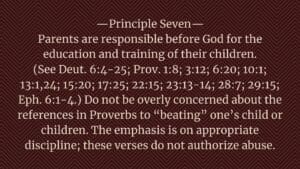
Karl Marx, by contrast, believed that children belonged to the state.
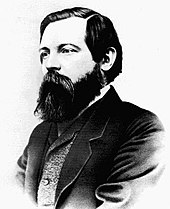
Consider the recent battles between parents and the education elites in school boards across America with regard to what children will be taught. Tell me, does the state own America’s children, or are parents ultimately responsible for them? We are at a crossroads in America with regard to this issue. It’s time for parents, and Christian parents in particular, to take a stand!
Ask one participant to read Deuteronomy 6:4-8,20-25 and another to read Ephesians 6:1-4. Discuss:
-
-
-
- Name several reasons why God gave the responsibility of raising and educating children to parents.
- What happens to children and their development when the state rather than parents have primary responsibility for future generations?
- Why is the quote we have cited from Karl Marx an affront to God and His plan for children, families, and nations?
-
-
Principle 8: Government’s job is to maintain order in society by commending those who do right and punishing those who do wrong. Nowhere in Scripture do we see any indication that it is government’s job to meet people’s needs. (See Rom. 13:1-7; 1 Pet. 2:13-17; 1 Tim. 2:1-2.)
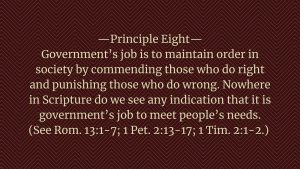
Karl Marx believed in upsetting and overthrowing order and establishing a “new order” rooted in socialist and communist principles. Note the ruthless nature of the following statements from Marx.
-
-
-
- We have no compassion and we ask no compassion from you. When our turn comes, we shall not make excuses for the terror.
- Catch a man a fish, and you can sell it to him. Teach a man to fish, and you ruin a wonderful business opportunity.
- The Communists everywhere support every revolutionary movement against the existing social and political order of things…They openly declare that their ends can be attained only by the forcible overthrow of all existing social conditions.
- The meaning of peace is the absence of opposition to socialism.
-
-
Ask: What evidence do we see in Romans 13:1-7 and 1 Peter 2:13-17 that government’s authority is not absolute, and that government is accountable to God?
Ask: In light of these four statements we’ve quoted from Karl Marx, how could socialism possibly be perceived as being compassionate?
Discuss: Again, this is evidence we must use discernment and respond to social justice rhetoric with our heads, not just with our hearts. Social justice crusaders preach compassion but stir up envy and animosity. They don’t encourage charity; instead they advocate government confiscation and redistribution of wealth. Government is not, nor can it ever be, compassionate. Government is bureaucracy. People are being duped into thinking that government is compassionate. This is why we must look to God’s Word to know how to faithfully execute justice. Only when we do this can we overcome social, cultural, and spiritual vertigo.
Principle 9: Remembering a godly heritage and God’s redemptive work keeps individuals and nations from straying away from the truth and from right living. (See Ex. 12:1-28; Deut. 5:12-15; 6:4-25; 24:17-19; Josh. 4:1-24; 1 Cor. 11:23-26; Eph. 2:11-13.)
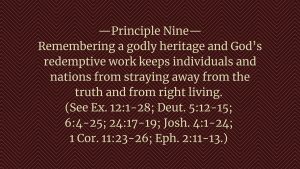
Karl Marx understood that distorting and misrepresenting a nation’s heritage would make the people vulnerable to takeover. It’s working. Everyone readily acknowledges that our Founding Fathers were not perfect, but can we not honor them for the heritage of liberty they bequeathed to us — one that, in the end, eliminated slavery and established civil rights for all? Even now America’s not perfect, but she has come a long way toward realizing her founding ideals of equal opportunity for everyone.
Here are three statements from Karl Marx that show He understood how to create and maintain social upheaval. On this issue, Marx was correct. Americans need to be wise to these insights today.
Ask participants to note that Exodus 12:1-28 instituted an annual observance; Deuteronomy 5:12-15 upholds a weekly observance, and Deuteronomy 6:4-25 affirms a continual observance. Describe the importance of intentionality and discipline in these efforts to remember.
Ask: Why is remembering the past so important to having the right perspective on the future? Emphasize that it isn’t just remembering that is important, but also appreciating God’s activity on behalf of His people. Ask: How can even remembering challenges and imperfections in the past, including the flaws of our ancestors, help us maintain a proper perspective on who we are and where we are headed?
Ask: How much damage can a tyrant or one who aspires to become a tyrant do if he or she can control the perceptions of a nation’s citizenry regarding that country’s history?
Ask: What actions can we take that will help us to effectively combat efforts to distort our history and our godly heritage?
Review and Conclusion
Here are three important takeaways from this Bible study:
-
-
-
- First, Marxism is taking hold in America, and a primary vehicle for this invasion and ongoing cultural realignment is the social justice movement.
- Second, Marxism and the social justice movement stand contrary to freedom, opportunity, and prosperity for all. Freedom-loving people everywhere must speak against them and educate their children to be wary of them.
-
-

-
-
-
- Third, the tenets of the social justice movement are antithetical to biblical teachings and therefore anti-Christian. Believers, and especially Christian leaders, need to overcome social and cultural vertigo — and spiritual vertigo as well — by grounding their judgments in objective truth, especially God’s Word. Pastors need to be preaching against the social justice movement, and Christians in the pews need to be warning their brothers and sisters in Christ about it.
-
-
In advance, reproduce this Bible study summary for each of your participants. Distribute the copies and encourage your group members to use the summary to follow up on the study.
Conclusion: With God’s help, Christians must conquer social, cultural, and spiritual vertigo. We can do this by being property grounded in God’s Word, by understanding what justice and liberty really are, by being alert and wary of social justice teachings, and by using our heads — not just our hearts — in the judgments we make.
Close in prayer, asking God to open eyes, minds, and hearts in the church and in the culture.

A Personal Note:
I hope this Bible study has demonstrated to you that the dangers of Marxism are the same dangers we encounter when we oppose God. Share these truths with others. Read Dr. Beisner’s booklet on social justice (also available here). If you’ve participated in this Bible study, consider leading a group using this same material. Additional Bible studies are available at discoverbedrocktruth.org/bible-studies
Be informed, inform others, and pray that God will open people’s eyes everywhere to the dangers of Marxism and the social justice movement.
Nothing less than the future of liberty, which includes the freedom to share the gospel with others, is at stake.
What did America’s Founding Fathers believe about each of the nine biblical principles we have studied, and about justice and liberty? Find out here. This material is suitable to use in a presentation to a group, especially in a follow-up session to this study.
A summary of the quotes and principles highlighted in this study is available here.
A list of the nine biblical principles and Marx’s quotes attempting to refute them (or misuse them to further his cause) is available here.
For further reading: “6 Persistent Myths About Socialism, Debunked” by Kay Coles James
Copyright © 2021 by B. Nathaniel Sullivan. All rights reserved.
Unless otherwise indicated, Scripture has been taken from the New King James Version®. Copyright © 1982 by Thomas Nelson, Inc. Used by permission. All rights reserved.
Notes:
1The word sovereign is used here, not in the ultimate sense, for only God is sovereign in this way. It is used to convey the idea that human beings have qualities that reflect that God has made them in His image, and that set them apart from the rest of God’s created order. Thus, human sovereignty does not mean that people are godlike, but that they are like God — capable of having preferences, making judgments, understanding and making moral and ethical choices, and designed to be free, not manipulated or controlled by the government.
2We explore both of these ideas in the 6-session Bible study series titled “Principles of Economic Liberty: The Biblical Case for Free Enterprise.” We talk about the connections between liberty and responsibility in session 3 and about the meaning of authentic justice in session 6. Please consider using this material in your own personal study or with a group. Currently the series is available online and free of charge.
3See the Conversations That Matter podcast with Jon Harris dated August 10, 2020. The title is “The Founding Fathers on Rights and Responsibilities.”
4This is the eighth principle presented in the Bible study series “Principles of Economic Liberty: The Biblical Case for Free Enterprise.” The list of ten principles the study examines is based on an important paragraph in an article about capitalism by the late theologian Dr. Ronald Nash.
5This is an idea mentioned by Del Tacket in of Focus on the Family’s DVD curriculum The Truth Project, (Colorado Springs: CO, 2006), lesson 11: “Labor: Created to Create.”
top image credit: Photo by Fa Barboza on Unsplash
